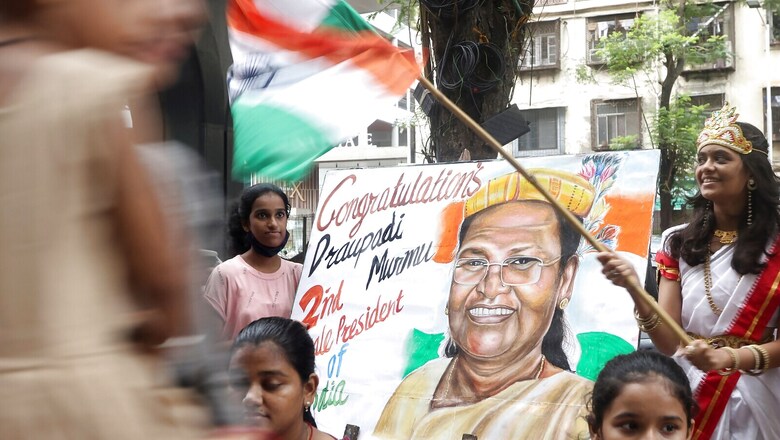
views
The importance of being President-elect Droupadi Murmu lies in her compelling narrative of hope: a girl born into a poor tribal community in a remote corner of India, bootstraps her way into Rashtrapati Bhavan. That enduring miracle of Indian democracy is exactly what Prime Minister Narendra Modi wants the world to see in India’s First Citizen.
The NDA’s brilliant choice of President not only puts the Opposition on the back-foot, but also sends a strong message of inclusivity and democratic values to the global community. A heart-warming instance of how, through sheer grassroots pressure, a vibrant democracy can bring someone from the absolute bottom of the social pyramid to its peak.
For the Opposition, the presidential election is yet another epic fail. It could neither unite behind Yashwant Sinha, nor pitch the battle as an ideological one. Once Murmu’s candidature was announced, the Biju Janata Dal and Jharkhand Mukti Morcha had no option but to vote for a ‘daughter of Odisha’ and a ‘tribal woman’, making her election a foregone conclusion.
The Congress and its regional allies are now in the uncomfortable position of having to deal with the fallout, i.e., the awful optics of having backed an upper caste, male, ex-bureaucrat against a Scheduled Tribe woman, for petty political reasons. Spinning such egregious political incorrectness to the electorate will call for creative thinking.
Going by past experience, Opposition strategists are more likely to harp on Murmu as an example of meretricious tokenism. Certainly, she represents a convergence of multiple subaltern identities of gender, caste, class and provenance. She is a woman, a Santhal (ST), poor (her assets are virtually non-existent) and from an underdeveloped region. Having come up from the grassroots, she cannot be said to have parachuted into the presidential office.
Looking behind the arc lights, we find that Murmu was fortunate, in fact, to have been the daughter (and granddaughter) of a village headman. She was able to attend school at a time when the female literacy rate hovered at around 20%. However, she had the spine and intelligence to leverage her school and college education into becoming a teacher, a state government employee and a successful politician. As a two-term legislator, she won an award for best-performing MLA.
She also had the ghastly misfortune of losing two sons within four years of each other, as well as her husband and mother. But she soldiered on, arguing that her soft-spoken, gently smiling persona masks a formidable resilience. In interviews, she has attributed it to a strong spiritual streak.
This strength of character and self-belief came to the fore when, as Governor of Jharkhand, she returned two controversial pieces of legislation that would have allowed tribal lands to be used for commercial purposes, to the then BJP chief minister. Tactically, she appended the 192 memorandums against the Bills that she had received.
The BJP hopes Murmu’s elevation will help in building trust with tribal communities in Jharkhand, where the controversial Bills led to the ‘Pathalgarhi’ movement and the BJP’s electoral defeat. Despite Murmu’s efforts to speak with tribal leaders, the movement spiralled into violence and a demand for self-governance. For their part, tribal activists hope that she will emerge as their champion.
The choice of Murmu also resonates with the BJP’s woman-centric welfare paradigm. By providing basic services like food, housing and cooking gas and cash transfers in rural and remote areas, the party has secured the electoral support of women, particularly those from marginalised communities.
A frequently asked question is whether the new President is likely to be a rubber-stamp. Or, will she, like her namesake in the Mahabharata, prove to be her own woman? While no President is expected to be openly confrontational, she could well follow the path charted by APJ Abdul Kalam, the ‘People’s President’. He was noted for his humility and connect with the public, for promoting dialogue, reaching out to young people and rendering gentle advice.
Howsoever she chooses her future trajectory, Droupadi Murmu’s election is historic. At birth, she was one of ‘The Invisibles’ — the tribal communities living in ultra-poverty in remote parts of India, unseen and ignored by policy-makers. Now, she is officially the face of the Indian Republic. In seeing her, we are forced to see where she came from. Therein lies the resounding triumph of democracy.
Bhavdeep Kang is a freelance writer and author of ‘Gurus: Stories of India’s Leading Babas’ and ‘Just Transferred: The Untold Story of Ashok Khemka’. A journalist since 1986, she has written extensively on national politics. The wiews expressed in this article are those of the author and do not represent the stand of this publication.
Read all the Latest News and Breaking News here




















Comments
0 comment